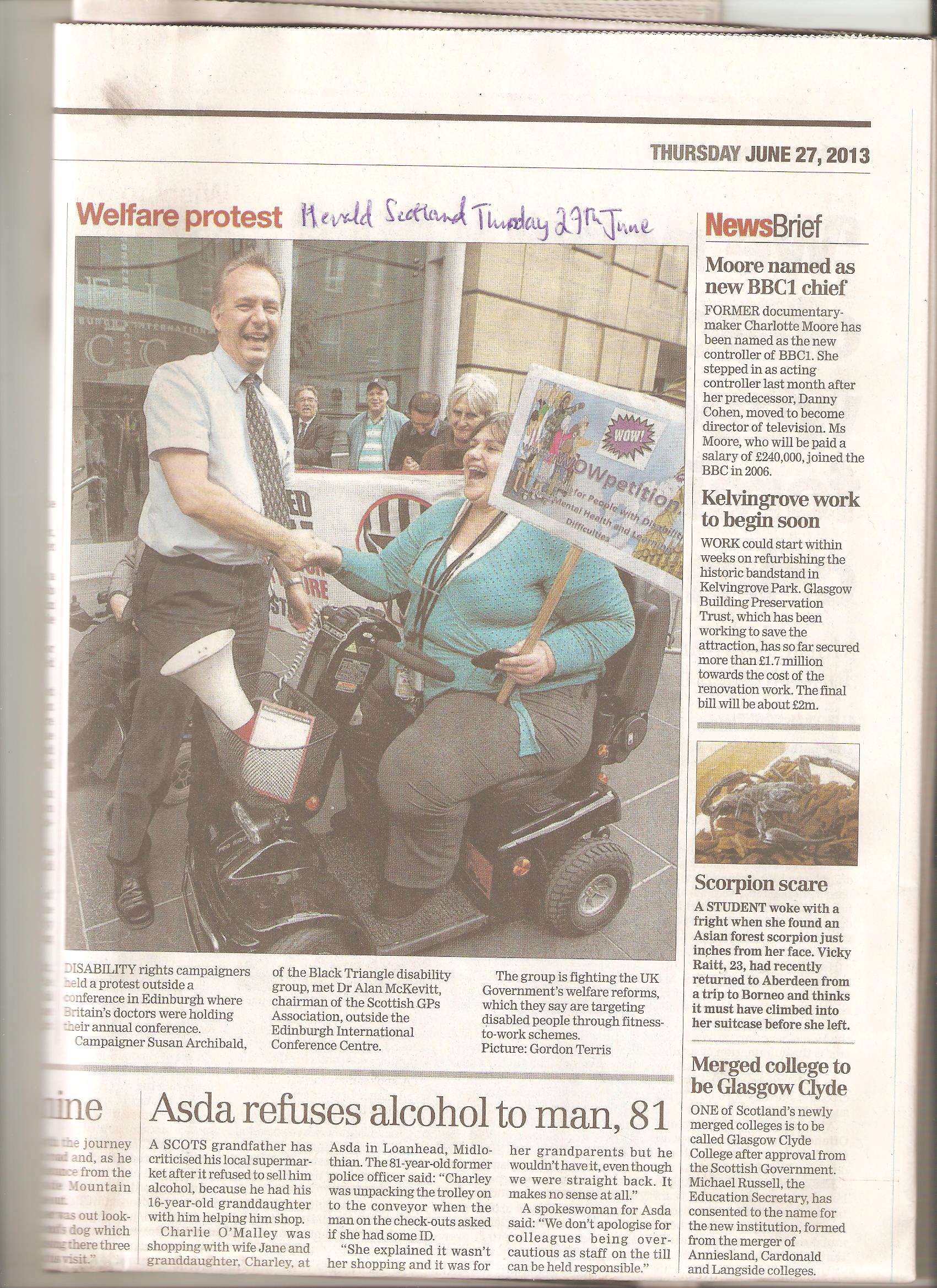
Disability Rights Activist Susan Archibald of The Archibald Foundation and Black Triangle with Dr. Alan McDevitt Chair of BMA Scotland’s General Practice Committee (above).
John McArdle handed in a copy of a letter signed by leading doctors, six general secretaries of Britain’s trade unions; medically allied professional bodies and fellow campaign groups in support of Black Triangle’s ESA Regulations 29 and 31 Campaign. Dr. McDevitt was also supplied with a copy of Black Triangle’s recent written submission to the Scottish Parliament’s Health and Sport Committee

Friday 28 June 2013 | By Madlen Davies
GPs should be asked to provide factual information for every Work Capability Assessment to enable ‘better-informed decisions’ to be made about their patient’s eligibility for benefits, says the BMA.
In a letter to the Government sent this month, BMA chair Dr Mark Porter said the current process is ‘insufficiently rigorous and consistent’ and causes ‘avoidable harm to some of the weakest and most vulnerable in society.’
The news comes as the Department for Work and Pensions (DWP) is planning to pilot a new approach to collecting information from claimants’ GPs, though a spokesperson could not confirm any details about the pilots as ‘options are still being considered’.
Dr Porter expressed disappointment at the lack of progress in implementing the recommendations of a review in 2010 into the DWP scheme to assess claimant’s fitness for work, run by private company Atos.
The review – by House of Lords and House of Commons select committees advisor Professor Malcolm Harrington, recommended further documentary evidence was obtained for every Work Capability Assessment before making a final decision on whether they could seek Employment and Support Allowance. Currently 40% of decisions are overturned at the appeal stage.
Dr Porter said the BMA had ‘continuing concerns’ about the programme and expressed his concern that the recommendations from Professor Harrington had not been implemented.
The letter said: ‘If the recommendation is implemented appropriately, with GPs providing factual information, it should result in better-informed decisions being made about eligibility for ESA by DWP decision makers, earlier in the process.’
This would lead to better-informed decisions, and would save GPs time, he said.
He added: ‘As well as making the system fairer for claimants, this should also significantly reduce the administrative cost of dealing with so many appeals.’
Dr Porter also called for an urgent update on the pilots proposed by the DWP to look into new approaches of collecting evidence to support claims.
A DWP spokesperson said: ’We are considering options for piloting a new approach to collecting further medical evidence in support of a claimant’s application for Employment and Support Allowance. We are not yet in a position to give further details.’
‘As always we are keen to strike the appropriate balance between seeking the right information for making a decision on someone’s benefits, and avoiding placing undue burdens on GPs.’
The news comes as the Department for Work and Pensions (DWP) is planning to pilot a new approach to collecting information from claimants’ GPs, though a spokesperson could not confirm any details about the pilots as ‘options are still being considered’.
Dr Porter expressed disappointment at the lack of progress in implementing the recommendations of a review in 2010 into the DWP scheme to assess claimant’s fitness for work, run by private company Atos.
The review – by House of Lords and House of Commons select committees advisor Professor Malcolm Harrington, recommended further documentary evidence was obtained for every Work Capability Assessment before making a final decision on whether they could seek Employment and Support Allowance. Currently 40% of decisions are overturned at the appeal stage.
Dr Porter said the BMA had ‘continuing concerns’ about the programme and expressed his concern that the recommendations from Professor Harrington had not been implemented.
The letter said: ‘If the recommendation is implemented appropriately, with GPs providing factual information, it should result in better-informed decisions being made about eligibility for ESA by DWP decision makers, earlier in the process.’
This would lead to better-informed decisions, and would save GPs time, he said.
He added: ‘As well as making the system fairer for claimants, this should also significantly reduce the administrative cost of dealing with so many appeals.’
Dr Porter also called for an urgent update on the pilots proposed by the DWP to look into new approaches of collecting evidence to support claims.
A DWP spokesperson said: ’We are considering options for piloting a new approach to collecting further medical evidence in support of a claimant’s application for Employment and Support Allowance. We are not yet in a position to give further details.’
‘As always we are keen to strike the appropriate balance between seeking the right information for making a decision on someone’s benefits, and avoiding placing undue burdens on GPs.’